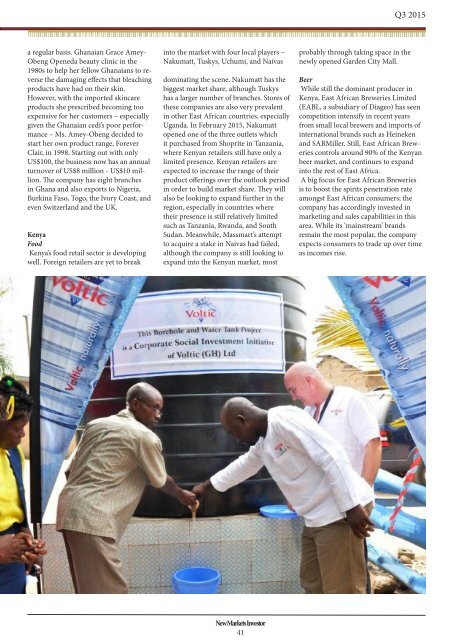Q3 2015countries’ demographic profiles andincome levels, and economic growthpotential, the following countries havethe strongest prospects for growth inthe sector over the next five to 10 years:Egypt, Morocco, Nigeria, Kenya, Ghana,Angola, Zambia, Mozambique andNamibia.. In the following report, is ananalysis of three of these countries, highlightingspecific product categories thatare expected to do well.GhanaFoodInformal markets dominate food retailat present. This should slowly startto change as the number of shoppingmalls rise, and consumers increasinglyprefer the convenience that is offeredby one-stop shopping at supermarkets.The latter trend is partly being drivenby the growing expatriate population inGhana, especially Accra. In addition, theshopping mall experience has proved tobe very popular in Ghana: Accra Mallattracts around 25,000 shoppers perweek. Currently, the most important supermarketchains in Ghana are the SouthAfrican chain Shoprite, and two domesticplayers, Melcom and Maxmart.BeerGhana’s beer industry is dominated bySABMiller and Guinness Ghana Breweries,with the beer market estimated ataround 1.76 million hectolitres. In recentyears, brewers have emphasised highendbrands to boost margins by gettingdrinkers to spend more on each beer theyconsume. While the cassava-based EagleLager and Ruut Extra Beer are far frompremium products, they are still morethan twice the price of popular homebrews, but have nonetheless been able totap a market that was previously servicedby illicit, unregulated products. SABMillerhas stated that the company expects tosource its cassava for its Eagle Lager fromas many as 1,500 smallholder farmerswithin the next year. The governmentcharges an excise tax of 47.5% for beersthat have less than 30% local content. Forbrews with more domestic ingredients,the excise tax drops to 10%. This followsthe Local Raw Materials law that imposesconcessionary excise duty rates on asliding scale on the use of raw materialsproduced in Ghana, in substitution ofimported raw materials in the productionof excisable goods.Soft drinksLarge beverage-producing companiesincluding Coca-Cola and PepsiCo havebeen operating in Ghana for some time.Coca-Cola’s operation in Ghana is madeup of Coca-Cola Equatorial AfricaLimited and its franchised bottling partner,The Coca-Cola Bottling Companyof Ghana (TCCBCG), while PepsiCooperates under the subsidiary BeverageInvestment Ghana Limited.Meanwhile, Voltic Ghana is the marketleader in bottled water in Ghana with an85% share of the mineral water market.SABMiller acquired a majority stakein Voltic Ghana in 2009. A significantchallenge facing the beverages sector inGhana is the fact that many materialsneeded to support growth of the sectorare not produced domestically, and haveto be imported. This renders the sectorvulnerable to exchange rate fluctuationsand keeps production costs relativelyhigh.Personal CareGhana has strong prospects for growth inall of the sub-categories of this segment.We highlight particularly strong prospectsfor oral care and make-up.According to the World Health Organisation(WHO), many African women usedamaging skin-bleaching products on<strong>New</strong> <strong>Markets</strong> <strong>Investor</strong>40
Q3 2015a regular basis. Ghanaian Grace Amey-Obeng Openeda beauty clinic in the1980s to help her fellow Ghanaians to reversethe damaging effects that bleachingproducts have had on their skin.However, with the imported skincareproducts she prescribed becoming tooexpensive for her customers – especiallygiven the Ghanaian cedi’s poor performance– Ms. Amey-Obeng decided tostart her own product range, ForeverClair, in 1998. Starting out with onlyUS$100, the business now has an annualturnover of US$8 million - US$10 million.The company has eight branchesin Ghana and also exports to Nigeria,Burkina Faso, Togo, the Ivory Coast, andeven Switzerland and the UK.KenyaFoodKenya’s food retail sector is developingwell. Foreign retailers are yet to breakinto the market with four local players –Nakumatt, Tuskys, Uchumi, and Naivasdominating the scene. Nakumatt has thebiggest market share, although Tuskyshas a larger number of branches. Stores ofthese companies are also very prevalentin other East African countries, especiallyUganda. In February 2015, Nakumattopened one of the three outlets whichit purchased from Shoprite in Tanzania,where Kenyan retailers still have only alimited presence. Kenyan retailers areexpected to increase the range of theirproduct offerings over the outlook periodin order to build market share. They willalso be looking to expand further in theregion, especially in countries wheretheir presence is still relatively limitedsuch as Tanzania, Rwanda, and SouthSudan. Meanwhile, Massmart’s attemptto acquire a stake in Naivas had failed,although the company is still looking toexpand into the Kenyan market, mostprobably through taking space in thenewly opened Garden City Mall.BeerWhile still the dominant producer inKenya, East African Breweries Limited(EABL, a subsidiary of Diageo) has seencompetition intensify in recent yearsfrom small local brewers and imports ofinternational brands such as Heinekenand SABMiller. Still, East African Breweriescontrols around 90% of the Kenyanbeer market, and continues to expandinto the rest of East Africa.A big focus for East African Breweriesis to boost the spirits penetration rateamongst East African consumers; thecompany has accordingly invested inmarketing and sales capabilities in thisarea. While its ‘mainstream’ brandsremain the most popular, the companyexpects consumers to trade up over timeas incomes rise.<strong>New</strong> <strong>Markets</strong> <strong>Investor</strong>41
- Page 1 and 2: Q3 2015Q3 2015Issue 3 Vol.10New Mar
- Page 3 and 4: Q3 2015
- Page 5 and 6: Q3 2015Energy20 Renewable energyAfr
- Page 7 and 8: New Markets Investor7Q3 2015
- Page 9 and 10: New Markets Investor9Q3 2015
- Page 11 and 12: New Markets Investor11Q3 2015
- Page 13 and 14: New Markets Investor13Q3 2015
- Page 15 and 16: Q3 2015: “Once we have the infras
- Page 17 and 18: New Markets Investor17Q3 2015
- Page 19 and 20: Q3 2015investment projects, or a pr
- Page 21 and 22: Q3 2015provide a semblance of inves
- Page 23 and 24: New Markets Investor23Q3 2015
- Page 25 and 26: Q3 2015SEACO M is not, however, res
- Page 27 and 28: Q3 2015WEF Africa 2015Africa Compet
- Page 29 and 30: New Markets Investor29Q3 2015
- Page 31 and 32: Q3 2015Bumbuna Hydroelectric Projec
- Page 33 and 34: New Markets Investor33Q3 2015
- Page 35 and 36: Q3 2015nations, South Africa may be
- Page 37 and 38: Q3 2015The development of Africanma
- Page 39: Q3 2015FoodCurrently, food dominate
- Page 43 and 44: Q3 2015NigeriaFoodThe Nigerian reta
- Page 45 and 46: New Markets Investor45Q3 2015
- Page 47 and 48: New Markets Investor47Q3 2015
- Page 49 and 50: New Markets Investor49Q3 2015
- Page 51 and 52: Q3 2015and are prepared to work in
- Page 53 and 54: New Markets Investor53Q3 2015
- Page 55 and 56: Q3 2015Africa’s largest, most vib
- Page 57 and 58: Q3 2015Côte d’IvoireIvory Coast
- Page 59 and 60: Q3 2015NigeriaFrom a political risk
- Page 61 and 62: Q3 2015SunPower designedand is cons
- Page 63 and 64: Q3 2015indirectly, become voluntary
- Page 65 and 66: New Markets Investor65Q3 2015
- Page 67 and 68: Q3 2015the result being to clear th
- Page 69 and 70: Q3 2015ManagementEducation witha Pr
- Page 71 and 72: New Markets Investor71Q3 2015
- Page 73 and 74: Q3 2015A smart, inter-connected urb
- Page 75 and 76: Q3 2015Naivasha, KenyaCasablanca, M
- Page 77 and 78: New Markets Investor77Q3 2015
- Page 79 and 80: Q3 20152014. This sets Nigeria’s
- Page 81 and 82: Q3 2015The Lilygate Lekki reception
- Page 83 and 84: Q3 2015in 2008. The industry produc
- Page 85 and 86: New Markets Investor85Q3 2015
- Page 87 and 88: Q3 2015Adesina promisedto work hard
- Page 89: Q3 2015Sectors in vogue with foreig
- Page 92 and 93:
Q3 2015New Markets Investor92
- Page 94 and 95:
Q3 2015equity investment. She estim
- Page 96:
Q3 2015New Markets Investor96









